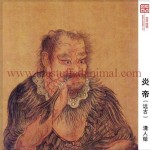Hai Rui (1514-1587 AD) was born in Qiongzhou, Hainan Province. In 1558 AD, he was appointed county magistrate of Chun’an County in Zhejiang Province. He cleaned up this notoriously corrupt county, setting an example of honest government.
In 1564, Hai Rui was transferred to an official post in the capital. The emperor, Shizong, was obsessed with Taoism and the “earch for immortality” and completely neglected state affairs. Though only a very junior official, Hai Rui had the courage to send a memorial to the throne, censuring the emperor. Fully convinced that the emperor would have him executed, Hai Rui bought a coffin, bade farewell to his wife, and settled his affairs. He was not, in fact, executed, but thrown into prison and not released until after Emperor Shizong’s death.
In 1569, Hai Rui was appointed imperial inspector of the 10 areas under the administration of Yingtian (including Suzhou, Yingtian, Songjiang, Changzhou, Zhenjiang, Huizhou, and others). Yingtian was the most advanced region in both economy and culture in the Ming Dynasty. Senior officials had carved out large estates for themselves there, depriving the state of large amounts of fertile land. Hai Rui insisted on the breaking up of these estates, and the return of the land to the peasants unconditionally. His enemies thereupon banded together to slander him to the emperor, Muzong, and Hai Rui was stripped of his official rank. After 10 years living in retirement, the new emperor Shenzong made Hai Rui magistrate of Nanjing. He held this post until his death in 1587. He was renowned far and wide as a model of an upright and incorruptible official.









Leave a Reply